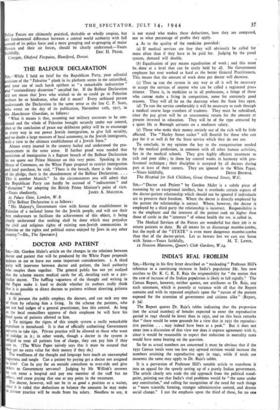DOCTOR AND PATIENT -
Sta,—Mr. Gordon Malet's article on the changes in the relations between doctor and patient that will be produced by the White Paper proposals appears to me to leave out some important considerations. 1. A third party will intervene between doctor and patient, the local authority who couples them together. The general public has not yet realised that the scheme means medical cards for all, detailing each to a par- ticular doctor. The baffling vagueness of the thought and writing in the Paper make it hard to decide whether its authors really think that it is possible to direct doctors to patients without directing patients to doctor.
2. At present the public employs the doctors, and can sack any one of 'them by refusing -him a living. In the scheme the patients, who are not bad judges of a general practitioner, lose this control. As long as the local councillors approve of their employee he will have his fixed quota of patients allotted to him.
3. To mitigate the rigors of this simple system a really remarkable expedient is introduced. It is that of officially authorising Government servants to take tips. Private practice will be allowed to those who want to indulge in it ; in other words, though a doctor in the system is Obliged to treat all patients free of charge, they can pay him if they care to. (The White Paper naively says that it must be assured that they get no extra value for their money if they do.) The woolliness of the thought and language here reach an unexampled vagueness and tangle. Can a patient by paying get a doctor not assigned to him? Can he pay for an outside consultant to over-ride and give orders to Government servants? Judging by Mr. Willink's answers he can enter a hospital and pay one member of the staff but no others, and cease paying that one at any point in the treatment. The doctor, however, will not be in as good a position as a waiter, since it is ruled that deductions to balance the amounts he may make in Private practice will be made from his salary. Needless to say, it is not stated who makes these deductions, how they are computed, nor to what percentage of profits they apply.
4. As to the quality of the medicine provided: (a) If medical services are free they will obviously be called for more often than if they have to be paid for. Judging by the panel system, demand will double.
(b) Equalisation of pay means equalisation of work ; and this must be. done at a level that can be easily held by all. No Government employee has ever worked as hard as the better General Practitioners. This means that the amount of work done per doctor will decrease.
(c) Thus to run the system in any way at all it will be necessary to accept the services of anyone who can be called a registered prac, titioner. There is, in medicine as in all professions, a fringe of those who cannot make a living in competition, some for extremely good reasons. They will all be on the doorstep when the State lists open.
(d) To run the service comfortably it will be necessary to rush through a medical course large numbers of students. They must be subsidised, since the pay given will be an uneconomic return for the amount at present invested in education. They will be of the type attracted by a quiet life as Borough servants on a mediocre salary.
(e) Those who make their money entirely out of the rich will be little affected. The "Harley Street racket" will flourish for those who can pay for it as well is for the State service which they do not use.
To conclude, in my opinion the key to the reorganisation needed by the medical profession, in common with all other human activities, lies in the medical schools. They give highly efficient treatment to rich and poor alike ; in them lay control works in harmony with pro- fessional technique ; their discipline is accepted by all doctors during part at least of their careers. They are ignored in the White Paper.


























 Previous page
Previous page